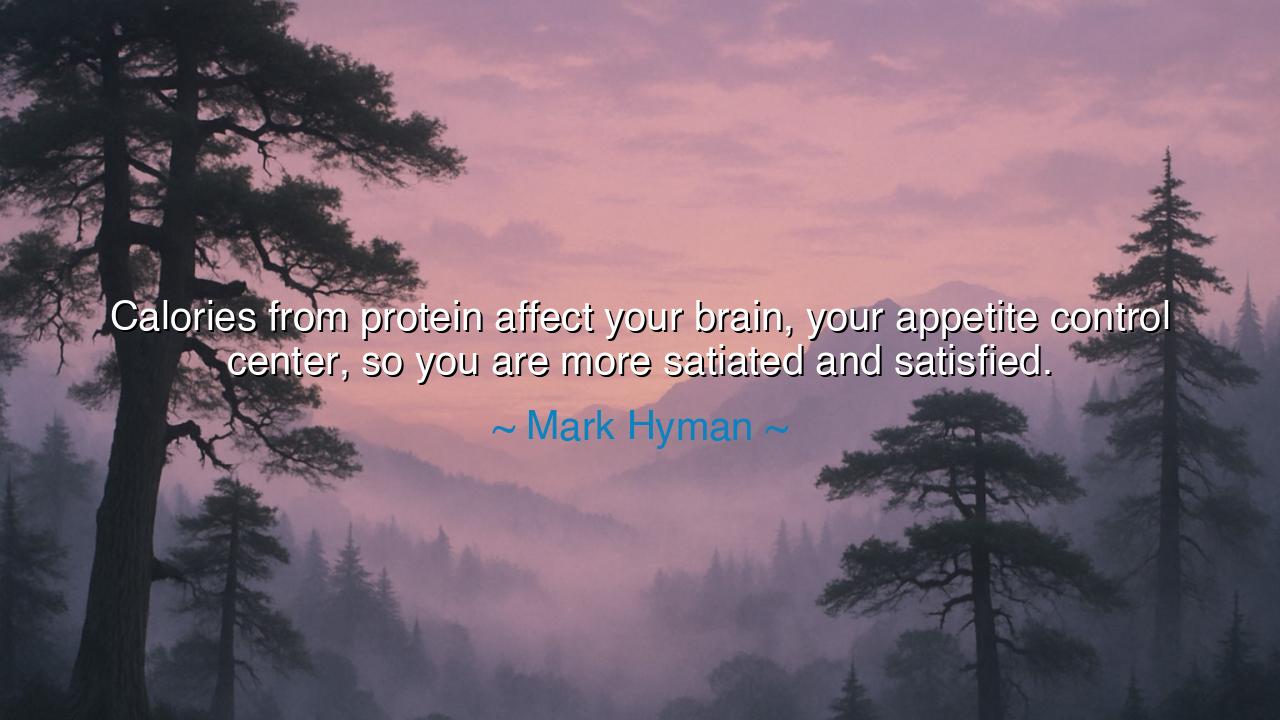
Calories from protein affect your brain, your appetite control
Calories from protein affect your brain, your appetite control center, so you are more satiated and satisfied.






When Mark Hyman said, “Calories from protein affect your brain, your appetite control center, so you are more satiated and satisfied,” he spoke not merely as a physician of the body, but as a philosopher of balance. Beneath the language of science lies a timeless truth about discipline, harmony, and the mastery of desire. His words reveal that nourishment is not just a physical act, but a sacred dialogue between body and mind — one that demands understanding, not indulgence. For to feed the body rightly is to calm the restless spirit within.
In this saying, Hyman speaks of protein, but what he truly describes is satiation — the art of being fulfilled rather than merely filled. He reminds us that not all food nourishes equally; some sustains strength and focus, while others awaken endless craving. The ancients would have called this wisdom the difference between temperance and gluttony. Protein, he says, reaches the very “appetite control center” of the brain — the throne of hunger itself — teaching the body to rest, to be content, to cease its constant yearning. Thus, he speaks not only of biology, but of the eternal battle between excess and balance, between the mind that commands and the desire that consumes.
This truth is not new. The Greek physician Hippocrates, centuries before modern science, taught that food should be medicine — a force of equilibrium, not of indulgence. He knew that what we consume affects not just our flesh, but our temperament, our thoughts, even our clarity of purpose. In the temples of healing, food was sacred, measured with reverence. So too does Hyman echo that ancient creed: to eat with wisdom is to govern the self. For the man who rules his appetite rules his destiny, while the one who is ruled by appetite becomes its servant.
We see this truth unfold in history. Consider the Roman general Marcus Aurelius, whose armies marched across vast lands, yet who lived with the simplicity of a monk. He ate to live, not for pleasure, knowing that the discipline of the body shapes the strength of the mind. His restraint gave him clarity in chaos and calm in temptation. Like Hyman’s teaching, it was not deprivation but mastery — the recognition that true satisfaction does not come from abundance, but from alignment between body and soul.
Protein, in Hyman’s words, becomes a symbol — not only of physical nourishment but of substance and stability. It is the element that builds, not the one that burns quickly and leaves us hollow. Just as the body requires protein to grow and repair, the spirit requires meaningful nourishment to thrive. The modern world is filled with empty calories of every kind — not only in food, but in distraction, in comfort, in vanity. They fill us but never fulfill us. To seek what truly satisfies — whether in food, in love, or in life — is the ancient art of wisdom reborn.
And so, Hyman’s quote is both a scientific truth and a moral allegory. The brain, he says, is calmed when fed with the right fuel. So too is the heart calmed when fed with truth. The same forces govern both: when we consume what is hollow, we crave endlessly; when we consume what is real, we are at peace. It is a lesson that reaches beyond the kitchen and into the very structure of life itself — that quality nourishes, while quantity deceives.
Let this, then, be the lesson for all who seek strength and serenity: feed yourself with what sustains, not what excites. Choose what builds over what merely entertains the senses. Eat, speak, think, and live in a way that leaves you satiated and satisfied, not restless and hungry for more. For fulfillment is not born of abundance, but of harmony — when the mind, the body, and the soul eat from the same table of purpose.
And remember, as the ancients taught and Hyman reminds: the wise do not eat to indulge their hunger; they eat to nourish their power.






AAdministratorAdministrator
Welcome, honored guests. Please leave a comment, we will respond soon